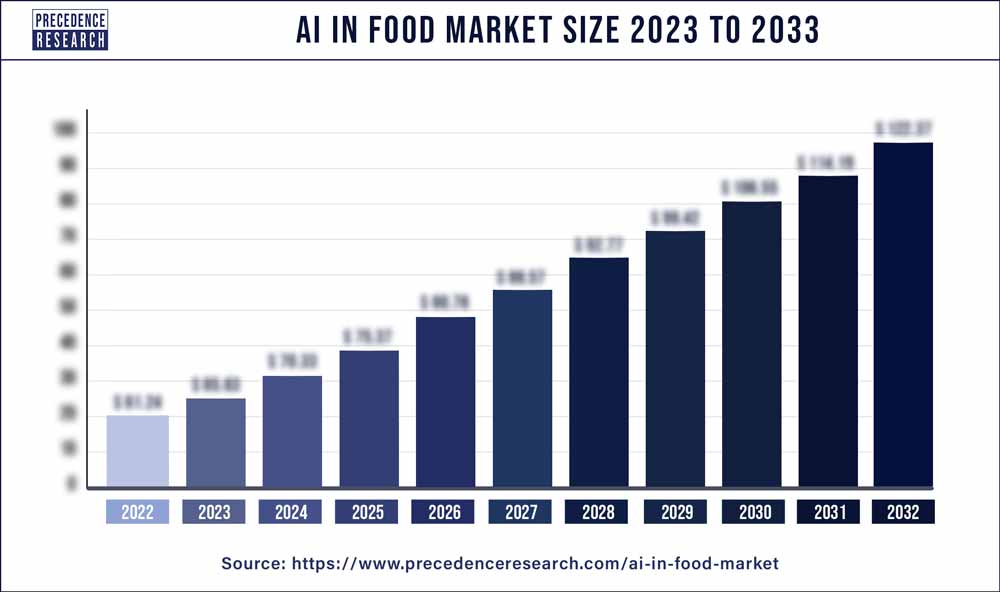The integration of AI in the food market is revolutionizing the way food is produced, processed, distributed, and consumed. With advancements in technology, AI has found myriad applications across various sectors, and the food industry is no exception. From ensuring food safety to optimizing supply chains and enhancing customer experiences, AI is reshaping the future of the food market.

Key Points
- Asia Pacific is observed to expand at the fastest rate during the forecast period of 2024-2033.
- By technology, the machine learning segment held the largest share of the market in 2023.
- By technology, the robotics and automation segment is observed to witness a significant growth during the forecast period.
- By application, the food processing segment held a significant share of the AI in food market in 2023.
- By application, the supply chain management segment is observed to witness the fastest rate of expansion during the forecast period.
- By end user, the food manufacturers segment held the dominating share of the market in 2023.
- By end user, the restaurants segment is observed to witness a significant rate of expansion during the forecast period.
Applications of AI in Food Industry
Enhancing Food Quality and Safety
One of the primary concerns in the food industry is maintaining high standards of quality and safety. AI technologies, such as machine learning algorithms, are being used to analyze data from sensors and other sources to detect contaminants, pathogens, and spoilage in real-time. This proactive approach allows for early intervention, reducing the risk of foodborne illnesses and product recalls.
Streamlining Supply Chain Management
The food supply chain is complex, involving multiple stakeholders and intricate processes. AI-powered systems enable better inventory management, demand forecasting, and logistics optimization. By analyzing data on factors like weather patterns, transportation routes, and consumer demand, AI helps in reducing waste, minimizing costs, and ensuring timely delivery of fresh produce.
Get a Sample: https://www.precedenceresearch.com/sample/3745
AI-Powered Food Production
Automated Farming and Agriculture
In agriculture, AI-driven solutions are transforming traditional farming practices. Autonomous vehicles equipped with sensors and AI algorithms can monitor crop health, detect pests and diseases, and optimize irrigation schedules. This precision farming approach enhances crop yields, reduces resource wastage, and promotes sustainable agriculture practices.
Smart Food Processing and Manufacturing
AI technologies are also enhancing efficiency and productivity in food processing and manufacturing facilities. Automated systems equipped with computer vision can inspect and sort food products with precision and speed. Additionally, AI-driven algorithms optimize production processes, leading to improved quality control and reduced energy consumption.
AI in Food Market Scope
| Report Coverage | Details |
| Largest Market | North America |
| Base Year | 2023 |
| Forecast Period | 2024 to 2033 |
| Segments Covered | By Technology, By Application, and By End-user |
| Regions Covered | North America, Europe, Asia-Pacific, Latin America, and Middle East & Africa |
AI in Food Packaging and Labeling
Smart Packaging Solutions
AI-enabled packaging solutions are designed to extend the shelf life of perishable food items and reduce food waste. Smart packaging materials equipped with sensors can monitor factors like temperature, humidity, and gas levels, providing real-time feedback on product freshness and quality. This helps in maintaining food integrity and ensuring consumer satisfaction.
AI-Enabled Labeling for Allergens and Ingredients
With the rise in food allergies and dietary restrictions, accurate labeling of food products is crucial. AI algorithms can analyze ingredient lists and detect potential allergens, helping consumers make informed choices. Furthermore, AI-powered labeling systems can ensure compliance with regulatory standards and improve transparency in the food supply chain.
AI-Based Food Delivery and Service
Efficient Delivery Routes Optimization
In the food delivery sector, AI plays a key role in optimizing delivery routes and schedules. By analyzing data on traffic patterns, customer locations, and delivery preferences, AI algorithms can suggest the most efficient routes for delivery drivers, minimizing delivery times and costs. This results in improved customer satisfaction and loyalty.
Personalized Customer Experiences
AI-powered recommendation systems are transforming the way food is marketed and served to consumers. By analyzing past purchasing behavior and preferences, AI algorithms can personalize recommendations for menu items, promotions, and discounts. This targeted approach enhances customer engagement and fosters brand loyalty.
Challenges and Concerns in Adopting AI in Food Market
Despite the numerous benefits of AI in the food market, there are several challenges and concerns that need to be addressed. Data privacy and security issues remain a top concern, as AI systems rely on vast amounts of data, including sensitive consumer information. Additionally, ethical considerations regarding the use of AI in food production, such as the potential displacement of human workers and environmental impacts, require careful consideration.
Future Trends and Innovations in AI for Food Industry
Looking ahead, the future of AI in the food industry holds exciting possibilities. Predictive analytics will enable food companies to anticipate consumer trends and preferences, allowing for more targeted product development and marketing strategies. Furthermore, advancements in AI-driven personalized nutrition will revolutionize the way individuals plan and manage their diets, leading to improved health outcomes and well-being.
Read Also: AI in Clinical Trials Market Size to Rise USD 18.82 Bn by 2033
AI in food market Companies
- Google LLC
- IBM Corporation
- ABB Ltd
- NVIDIA Corporation
- Microsoft Corporation
- SAP SE
- Buhler Group
- Impact Vision
Segments Covered in the Report
By Technology
- Machine Learning
- Computer Vision
- Robotics and Automation
By Application
- Precision Agriculture
- Food Processing
- Supply Chain Management
- Retail Services
By End-user
- Food Manufacturers
- Farmers and Growers
- Restaurants
- Others
By Geography
- North America
- Europe
- Asia-Pacific
- Latin America
- Middle East and Africa
Contact Us
Precedence Research
Apt 1408 1785 Riverside Drive Ottawa, ON, K1G 3T7, Canada
Call: +1 9197 992 333
Email: sales@precedenceresearch.com
